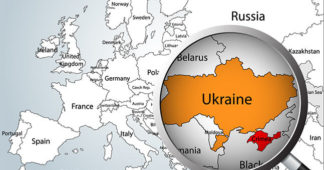Russia’s deputy foreign minister said Moscow has warned the U.S. that pouring weaponry into Ukraine is a “dangerous move.”
By Jake Johnson
A top Russian diplomat said Saturday that Moscow has informed U.S. officials that it views Western arms shipments to Ukraine as “legitimate targets” for military attacks, heightening fears of a direct confrontation between the nuclear-armed powers.
“We warned the United States that the orchestrated pumping of weapons from a number of countries is not just a dangerous move, it is a move that turns these convoys into legitimate targets,” Sergei Ryabkov, Russia’s deputy foreign minister, told a state television outlet Saturday morning.
Ryabkov added that Moscow emphasized to Washington “the consequences of the thoughtless transfer to Ukraine of weapons like man-portable air defense systems, anti-tank missile systems, and so on.”
While U.S. President Joe Biden has vowed not to involve American troops directly in any conflict with Russia, the administration has been pouring arms and advanced weaponry into Ukraine for months, shipments that ramped up after Russia launched its full-scale invasion on February 24.
On March 4, as the New York Times reported, “some 14 wide-bodied aircraft transported a bristling array of Javelin antitank missiles, rocket launchers, guns, and ammunition to an airfield near Ukraine’s border.”
“The top U.S. military adviser to President Biden inspected the weapons transfer operation in an unannounced trip, meeting with troops and personnel from 22 countries who were working around the clock to unload the armaments for transport by land to the Ukrainian forces,” the Times continued. “The American weaponry, which included the Javelins as well as small arms and munitions, was part of a $350 million package that Mr. Biden authorized.”
“Within two days, one official said, the deliveries were landing at an airfield near the border that can process 17 airplanes a day,” the Times added. “What began as a trickle—with only two or three planes arriving a day—is now a steady flow, the official said, with 14 loads from one airfield alone.”
The Washington Post reported Friday that the Biden administration is currently “working with European allies to expedite more sophisticated air-defense systems and other armaments into the war zone.”
Ryabkov’s remarks Saturday came after NATO Secretary-General Jens Stoltenberg warned that a Russian attack on supply lines of countries providing weapons to Ukraine—which is not a NATO member—would constitute a dangerous escalation.
“The allies are helping Ukraine uphold their right for self-defense, which is enshrined in the U.N. Charter,” Stoltenberg said in an interview with CBC News.
“Russia is the aggressor and Ukraine is defending itself. If there is any attack against any NATO country, NATO territory, that will trigger Article 5,” Stoltenberg added, referring to the self-defense clause of NATO’s founding treaty.
The Intercept‘s Jeremy Scahill argued in a column on Thursday that the rapid acceleration of arms shipments into Ukraine represents “a significant escalation of Western involvement” in the deadly conflict.
“It is understandable and reasonable that people across the U.S. and Europe are demanding their governments send more weapons to support Ukraine in resisting the Russian invasion,” Scahill wrote. “Without the Western-supplied weapons Ukraine already possessed, it is very likely Russia would be in control of much larger swaths of the country.”
“It is also vital,” Scahill added, “that people advocating such a policy consider whether a sizable increase in U.S. and NATO weapons transfers will prolong the conflict and result in even more civilian death and destruction.”
Published at www.commondreams.org
We remind our readers that publication of articles on our site does not mean that we agree with what is written. Our policy is to publish anything which we consider of interest, so as to assist our readers in forming their opinions. Sometimes we even publish articles with which we totally disagree, since we believe it is important for our readers to be informed on as wide a spectrum of views as possible.











